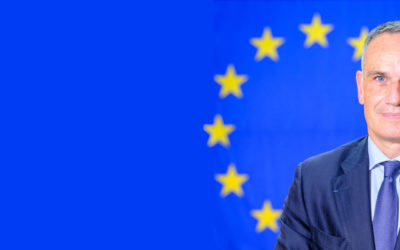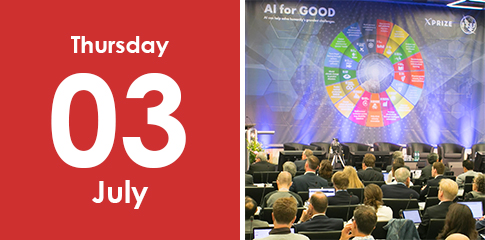Matteo Guidotti is a senior lecturer, consultant, and trainer with over 25 years of experience in international development and not-for-profit, strategic project management, and evaluation. He is the Academic Advisor of the Strategic Project Management for Development (SPMD) programme, the Regional Academic Coordinator of the Executive Programmes in Development Policies and Practices (DPP) for African English-speaking countries, and a Research Associate with the Centre on Conflicts, Development and Peacebuilding (CCDP) at the Institute.
We asked him a few questions about his expertise in our Executive Education programmes at the Institute.
You have directed the Strategic Project Management for Development (SPMD) since 2021. Could you give us more details about the vision of the programme and the reason for its creation?
The Institute has been involved in Project Management in the development realm for many years, and these skills have been taught in different programmes and courses. In 2021, the Executive Education leadership acknowledged the Institute’s importance in profiling itself in this critical domain and decided to include a dedicated programme in its portfolio. The demand is important, and it’s easy to understand why such expertise has become vital for any organisation that manages and uses rare resources and/or taxpayers’ money.
In the last years, the international context has become increasingly demanding for any actors operating in the development and not-for-profit space: on one side, the financial resources available for international development have become scarcer (the 2008 financial crisis, followed by the COVID pandemic and the current geopolitical instability have redirected resources, increased pressure on public finances, narrowed fiscal spaces, and created new competing domestic and international agendas); however, at the same time, donors expectations have increased, and they demand recipient countries to be more effective, efficient, transparent and accountable on the use of such resources, and ultimately to prove tangible impacts.
Not easy to address these seemingly contradictory trends, right? So, one way is by adopting better management practices. Only the most performant organisations can nowadays succeed in raising funds to sustain their operations, ensure the continuity of their programmes, and fully meet donors’ standards. Building PM capacities among employees, integrating Results-Based Management principles in their PM frameworks, and engineering highly responsive operational PM procedures have become a management imperative for these organisations and a way to ensure their own existence.
As a senior consultant and evaluator in international cooperation and development, what key innovations have you observed in the last few years in PM?
Since the Marrakech Roundtable on Managing for Development Results (2004), the development community has been increasingly emphasizing the results of development initiatives rather than merely their activities and outputs, rightly believing that this will increase aid’s impact on reducing inequalities and fighting poverty. This has led, at least on paper, to a series of significant critical reforms on how development programmes should be designed, implemented and evaluated. Among others, two essential management instruments that address such concerns have gained traction: the Theory of Change (ToC) and the Results-Based Management (RbM) frameworks. More recently, other innovations have emerged that revolve around adaptive implementation methodologies, iterative planning, and the use of technology to collect, analyze and report data from the field.
While it is undeniable that improvements have taken place, in my practice as a project evaluator, I observe that projects still too often lack to explicitly address two essential elements: Firstly, how the intended change is expected to unfold, under which underlying conditions and assumptions; secondly, how planning and management tools such as the logical framework, the monitoring or the risk management plans are expected to capture and manage the change achieved by the project properly. Based on this observation, the content of the SPMD programme has been structured following the project cycle management (PCM), with the ToC, the RbM, and adaptive methodologies mainstreamed in each phase of its cycle. The programme thus provides a flexible, solid, comprehensive PM methodology that can be used in different contexts and sectors, from development to social business and policy making.
What are some of the critical challenges to managing projects in the context of international cooperation and development?
I think this is a very interesting question: in terms of skills, project management is technically challenging all over the world, regardless of the context and the sector; this probably explains the popularity of PM certifications and courses.
Nevertheless, PM is so complex in international cooperation because each recipient country has sovereign institutions and social and cultural realities. As a social scientist and a citizen, this raises many critical issues. To list two of them: how can we ensure the legitimacy of a development initiative implemented in a given recipient country that directly impacts the lives of its local communities when such initiative has been conceived and designed by donors outside the domestic democratic institutions of such country? How can we design effective, culturally aware, and sensitive development initiatives when local cultural norms, beliefs, and traditions may not be aligned with the imperative to protect diversity and fight discrimination?
We know there isn’t a straight and unique answer to such complex issues; nevertheless, at least three elements stand out in my eyes. Firstly, we need to establish in donors and recipient countries’ organizations sound PM frameworks; secondly, we need to ensure the active inclusion of key stakeholders (and the beneficiaries!) in the project’s design, implementation, and M&E. These two minimum conditions can contribute to shoring up legitimacy and navigating through complex and conflicting cultural rationales; they can also ensure the articulation of locally negotiated solutions, tailored to the specific contexts. The third element, which is equally important, is that we need to become aware of the urgency to set as the ultimate goal of any initiative the improvement of the human condition and our entire ecosystems.
***
Want to learn more about our Executive Programmes? Visit our website









0 Comments